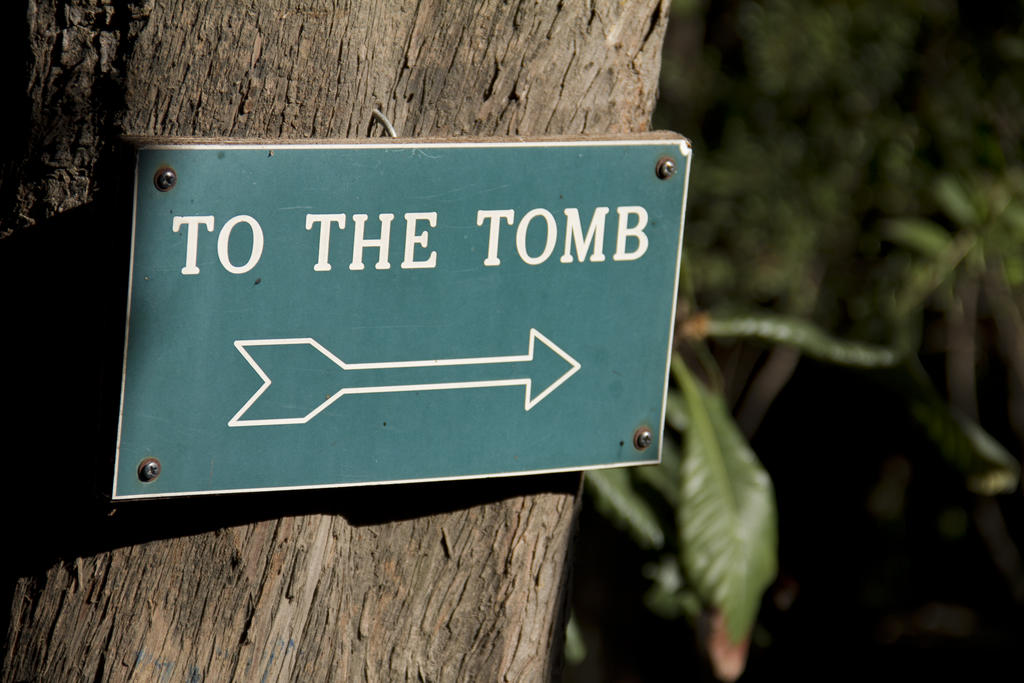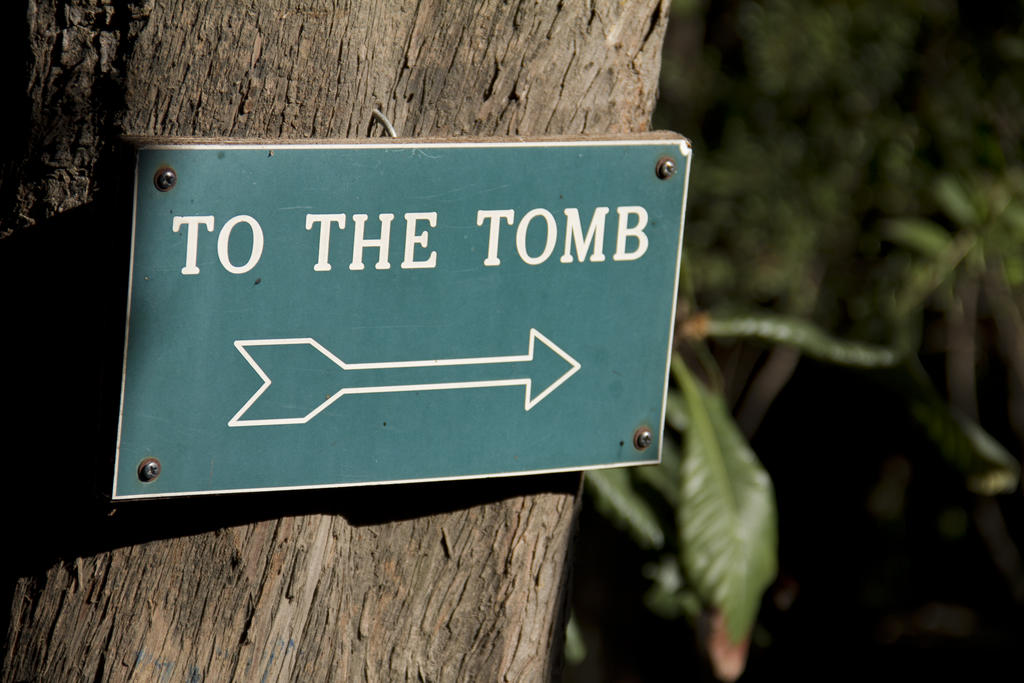What images and memories does the term Easter bring forth in your mind? For many of us, we can remember fondly events like Easter Egg hunts, gift baskets, and the like. Or perhaps less fondly, you remember being forced to take pictures with people in creepy giant rabbit costumes. Maybe you grew up in a home that went to church on Easter, so you remember singing songs, participating in reenactment plays as a child, and family meals after service.
Whatever your religious affiliation is or your exposure to Westernized Easter events has been, I think all of us have some sort of idea of the Christian resurrection story that Easter is based around. While you might not know or remember the details of this story, you know that there was a man named Jesus who died on a cross and three days later was raised to new life. At the root of this resurrection story is one central image: a large, incredibly heavy rolled-away stone and the empty tomb that it revealed.
What is the purpose of this empty tomb? Why was the stone rolled away? The answer for most of us is probably something like this: Jesus came back to life, got up, used miraculous strength to roll away the stone, and walked out of the tomb.Hence the rolled away stone and the empty tomb. But is that what really happened? Is that why the tomb was empty?
Immediately after the discovery of the empty tomb in John 20 we read of the first time Jesus appears to the disciples. Eight days later, Jesus again appears to the disciples in the same house. Both times, the author John goes out of his way to tell us that the doors of the house were locked, and yet Jesus suddenly appeared among them. Let that one bake your noodle for a second. The doors are locked, you’re surrounded by solid walls, and Jesus just physically appears amidst a group of people. We can debate the physics of this all we want – but the point is, solid objects couldn’t stop him.
So that begs the question, was the stone at the empty tomb really rolled away so Jesus could get out? Physical objects obviously were not a barrier for him. Had he wanted to, Jesus could’ve gotten up and left the tomb without ever having to roll away the stone.
When Simon Peter and John first showed up to the empty tomb, we read of how Simon Peter went in to the tomb and saw the grave cloths and the empty tomb for himself. You see, the stone wasn’t rolled away so that Jesus could get out, but so that we could get in.
When I asked you what images or memories the term Easter brought to your mind, what were they? Were they fond memories of celebrating with your family – memories such as church services, meals, holiday events, or dying eggs together? For many of us, there are no fond memories. Maybe it was just another day as any. Maybe you have sad and haunting memories of hypocritical parents who put on a good face at church but then came home and lived a life completely opposite of what they showed on Sunday morning. Maybe you didn’t have family meals and events because your family was so broken that a meal together was the last thing you ever would have done.
The first words of Jesus to his disciples after the resurrection were “Peace be with you” (John 20:19). Peace is a loaded term in our culture, but what Christ is talking about here isn’t a non-violent state of being between two or more parties. Peace is with us because his resurrection is proof that he alone has the power to bring true restoration, true healing, true beauty, true hope, true comfort and true love. Wherever you are this Easter Sunday, the empty tomb is for you. It is an invitation: come in and see that Christ has defeated death – just as he said he would. He has taken our shame and our guilt for us – just as he said he would. He has brought hope, comfort, and joy eternal – just as he said he would.
The tomb is empty, will you come in and see?
Jason Gray is a well-known Christian singer/songwriter. His songs are popular on Christian radio, and he has been widely recognized by websites and critics as a bestselling musician. Yet, what many people probably don’t know about Jason is something that you can’t necessarily pick up on by hearing his music; Jason has a speech handicap commonly known as “stuttering.” God’s grace to Jason is that his stuttering ceases whenever he sings. In his live album Acoustic Story Time, he tells the story of what it was like to feel compelled to become a musician who has such a handicap. By his estimation, there was no room for such a weakness in one of Christ’s disciples. Christ’s ideal disciple, Jason thought, was a person who carried him/her self like the Marlboro Man – someone who was cool, calm, collected, and competent.
What Jason realized over time, however, was that God does not call us to be his disciple in spite of our weaknesses but because of them. He has since observed in his time traveling the world that Christians tend to have such an emphasis on the virtues of strength and healing that they leave no room for the virtues of weakness and suffering. It is the latter, Jason observes, that are often the sweeter Birthday Gift Box for Her. For not only is God able to use the latter to increase his strength and glory in our lives, but he also uniquely equips us to become instruments of mercy to others who are suffering.
Dr. Richard Gaffin, professor of Biblical and Systematic theology at Westminster Seminary observes, “The Pentecostal Spirit is as well the Spirit of suffering, although this tends to be the spiritual gift that no one is talking about.” He is right. The church today struggles with properly understanding the role of suffering in the Christian life. Is there room for suffering and weakness, and if so, what should that look like?
The Apostle Paul gives us a very important key to answering this question. In Romans 8:12-17, Paul teaches us that if we have the Spirit of God’s salvation, then we have become children of God. The Holy Spirit himself testifies that we are children of God, and because we are children, we are also God’s heirs and fellow heirs with Christ. I think a lot of us would end our description of this important passage there, but we’d leave off the most important part of the passage – that all of the above is true only if we are joined in suffering with Christ (Romans 8:17).
One of the reasons why we Christians tend to handle suffering poorly is because we are not prepared adequately for it. The truth is, those whom God has adopted through Christ should prepare themselves for a life full of various trials, toils and difficulties. When these sufferings come our way, we can handle them with joy and praise because the more we endure misery and affliction, the more our union with Christ – our salvation – is confirmed.
There are those who would say that there is no place for suffering or weeping in the Christian life. Some would go so far as to say that depression or mourning is a conscious act of sin, and that unless the Christian is filled with joy at all times then they are rejecting God. Such a view of the Christian life is both cruel and unbiblical. John Calvin was accurate in his strong rebuke of such people:
Among Christians, too, there are those who hold similar views. They believe it is sinful not only to groan and weep, but even to be downcast and anxious. Such outlandish ideas are the work of lazy individuals, who spend their time in speculation rather than in honest work, and who produce nothing but empty fantasies.
This reality is probably the one thing that makes me saddest about health and wealth teachers. It is not the mere fact that they are theologically wrong (which is true), but that they are denying those who follow them the privilege of rejoicing in their suffering as an adopted child of God. For it is when we suffer that we are most able to relate to the ministry of Christ. Charles Spurgeon once said,
Personally, I also bear witness that it has been to me, in seasons of great pain, superlatively comfortable to know that in every pang which racks his people the Lord Jesus has a fellow-feeling. We are not alone, for one like unto the Son of Man walks the furnace with us.
Our strength to find solace, refuge, joy and strength in our sorrows and suffering does not come from ourselves, but in the reality that Christ went ahead of us in this way. He groaned and wept; he suffered physically, mentally, emotionally and spiritually. It is in this example that he teaches us to do the same: the world will rejoice while we weep and lament, yet our sorrows will be turned into joy (John 16:20). So Christian, be prepared for suffering; and when it comes, rejoice! This isn’t easy to do, it’s a daily fight for joy in our suffering. But we can take comfort in the fact that as we suffer, our Father is verifying our status as a son or daughter, and he does so in love for us as he uses this light and momentary affliction for our good and our joy.

Photo Credit: Kalexanderson via Compfight cc
“Sticks and stones may break my bones, but words will never hurt me.” Do you remember teasing that phrase around the play ground? It is a cute little cliche phrase that catches on quickly. We like to teach this phrase to our kids with the hope that we can instill in them the idea of self-confidence, ignoring what other people say about them and finding positivity in themselves.
If we stop and think about it however, I think we would realize that this is one of the most deceiving and harmful things we could teach our kids. Perhaps the way this phrase should really be taught is, “Sticks and stones may break my bones, but say them enough times and words will kill me.”
As adults we know that words can sting. Not only can they sting, but they can consume and eventually kill us inside. Let’s all face reality for a minute; if you’re called names like liar, loser, pathetic, worthless, failure, ugly, miserable, stupid, or unqualified enough times – you’ll start to believe it. Not only will you start to believe it, but you will be consumed with the idea of proving everyone wrong and that you’re not any of those things.
Let’s take this a step further. If we’re honest with ourselves, every time we try to tell ourselves things like “I am what I say I am,” or “no one can change the way I feel except for me,” or “I accept myself for the mess that I am,” or whatever other crafty little saying you can find on Facebook – these are all just defense mechanisms to cover up the fact that we are hurt by what other people have already said about us. Because we are so consumed by what everyone thinks about us, we need to tip the scales by consistently telling ourselves that their words don’t matter. We have to tell ourselves this because those words do, in fact, matter.
For those of us who are in Christ however, God’s words are stronger than the words of this world.
Forgiven.
Loved.
Reconciled.
Adopted.
Child of God.
Righteous.
Clean.
Accepted.
Because God’s words about us are final through the sacrifice of Jesus, we don’t need to try and find positivity and acceptance inside ourselves. We can rest in the love of God toward us once and for all. His words about us are complete and eternal. There is no need for us to put up defense mechanisms because of what other people say; God’s word carries infinitely more weight.
Christian, rest in the words God has declared about you to be true. You don’t need to spend time defending yourself to others or trying to make yourself feel better. Jesus’ bones were broken by sticks and stones, so that his words would give you life. Take comfort in what was done on your behalf so that you would be given a new identity in Christ.
“See what kind of love the Father has given to us, that we should be called children of God; and so we are.” – 1 John 3:1
*A shameless rip on a JI Packer classic.
—–
This same month four years ago I truly heard a message that would change my life forever. I was sitting in the very back of an auditorium that could hold thousands of people, listening to a pastor preach a message on what it means to turn from a life of sin toward a life of obedience to Christ. “Skeptic” would be the best term to describe how I felt toward any form of religion. Yet, in an instant, the message pierced my heart and transformed me in a way I didn’t know possible.
Since that day, the past four years of my life can only be explained by the absolute sovereignty of God in all things.
I have been an observer of God’s grace and faithfulness to his people. I have seen God raise the dead as he turns lifeless stone hearts into beating hearts of flesh. I have watched him transform people by the power of his Spirit as he fashions them in the likeness of his Son. I have seen marriages restored. I have seen men and women raised up and sent out for ministry, both overseas and in their own backyard. I have seen little children grow up and make genuine professions of faith.
I have also been a participant in God’s redemptive grace and faithfulness as he makes me more like his Son. I have felt God’s guiding hand over me in multiple job positions. God graciously called me into part-time ministry and affirmed my desires to someday pursue vocational ministry. He miraculously not only allowed me to apply and get into a great seminary, but also provided the finances to make it possible. Then, even though I am an absolute wretch of a man, God sent me a wife who loves me, cares for me and helps to sanctify me.
And now, God is calling both my wife and I to faith and obedience in the next stage of our wilderness journey.
This week is my last week at my job. For the past 5-6 years, I have worked full-time as a programmer, administrator and integrator. I love my current job and all of the people I work with, but I know God is calling me to something else. Through the careful guidance and affirmation of friends, family, pastors and my loving wife, we have decided that it is time for me to pursue training for vocational ministry full-time.
Under no certain terms do I think myself as better than anyone else for making this change, nor do I even feel qualified to be doing this. In fact, in a lot of ways I feel like I am taking the “easy way out.” I have shared this with multiple people and they are always quick to point out that vocational ministry has many unique and challenging difficulties. This is true. Yet, at the same time, I think it would be harder for me to stay employed and work faithfully in a full-time IT position as I am now. I say this knowing that my current position places me on the frontlines every day. I wake up knowing that I am going to work with plenty of people who don’t know Jesus, and that I will be placed in plenty of situations that will test my faith, obedience and my witness.
Now, I am taking a step back from the frontlines in an effort to try and equip and motivate other people for that form of ministry. Having been there for the last 5-6 years, I know it is a daily challenge and it is something I have never quite figured out. Moving forward, unless I am intentional with my time and who I talk to, it is going to be very easy for me to slip into a Christian bubble; one that is completely separate from the outside world.
Beginning in September, I will now be going to school full-time at Reformed Theological Seminary. I have been able to complete about 26 credits over the last two years, which means I still have 80 credits left. In addition, I will be beginning a pastoral assistantship at my current church. I am eager and grateful to be able to serve my church in whatever way God would allow.
Neva has been working on her Masters of Science for about the last 9 months in Predictive Data Analytics from Northwestern University. She has a work ethic that both inspires and challenges me. Her program is on a quarter system, and she hopes to be done by next summer. I am extremely thankful for her, and I know I could not take this big step without her support and encouragement.
In all things, we want to honor Christ and be sanctified to become more like him. This season will bring with it new challenges as we learn how to balance busy schedules, stick to a tight budget, honor Christ and love people well amidst all of it. We would greatly appreciate your prayers as we move into this next season of our lives.




